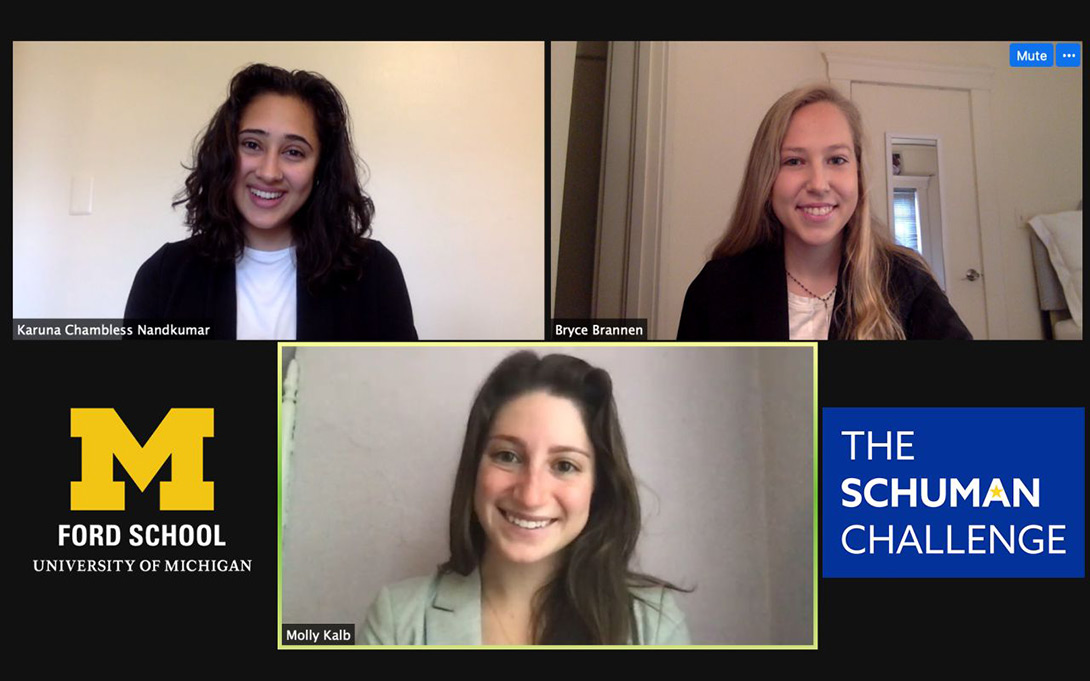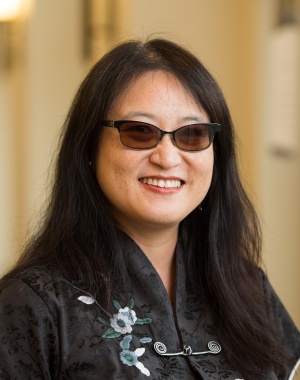
Since its launch in 2019, the Weiser Diplomacy Center (WDC) has sought to develop new practical student training opportunities in foreign affairs. One key element is to expand the Ford School’s menu of international policy simulations.
“Reading about foreign policy processes is not enough,” says John Ciorciari, director of WDC and the International Policy Center (IPC). “Simulations enable us to experience the process, hone argumentative skills, and learn about stakeholder interests by joining the debate.”
In two recent exercises, Ford School students examined the changing nature of China’s global influence. At the Schuman Challenge, organized by the European Union’s (EU) delegation to the U.S., a team of three students and faculty advisor Ann Lin participated in a “case competition”, in which they had to address a policy challenge and come up with a solution in a very short amount of time. The question for them was, “How should the EU and the U.S. respond to China’s alternative models of governance?”
In a separate experience, 16 students participated in the U.S. Army War College’s (USAWC) International Strategic Crisis Negotiation Exercise, which constructed a United Nations Security Council-mandated peace conference in Jakarta to look at the multinational conflict in the South China Sea.
The Schuman Challenge team — Bryce Branner, Molly Kalb, and Karuna Nandkumar (all BA ‘21) — placed second out of 29 teams from universities across the country. It is only the second time the Ford School has participated. The team chose debt relief for African countries as their case study, arguing that the increased economic burdens caused by the COVID-19 pandemic require a strong response, and that the U.S. and EU, via the Paris Club and International Monetary Fund, can make a difference. They argued that China would be pressured to follow suit in easing the enormous debt owed to the government and its institutions.
“Researching and presenting as a team was a really rewarding experience and allowed all of us to take full advantage of our different strengths. The judges consistently cited our strong teamwork and effective pragmatic approach as aspects that set us apart from our competitors,” says Kalb.
Two days before the event, they did a practice session with a panel consisting of Lin, Ciorciari, and Ford School professors Mel Levitsky, Alan Deardorff and John Leahy -- at 9 PM! “Having the opportunity to hear questions from a group of faculty who hadn't been working with them really helped the students prepare for the experience of defending their proposal in front of unfamiliar judges. I was so impressed by the dedication of both the students and the faculty to meet so late at night,” says Lin. “Molly, Karuna, and Bryce really wanted to come up with innovative ways to meet the challenge that COVID-19 has imposed upon the world system. Their proposal showcased how competition between the world's great powers can be designed to meet humanitarian needs.”
The final presentations of the three-day event were judged by Stavros Lambrinidis, Ambassador of the European Union to the United States, Karen Donfried, President of the German Marshall Fund of the United States and Jim Sciutto, CNN National Security Correspondent. (You can watch the final round presentations here. The Ford School team begins its presentation at 1:01:55).
The judges commented, “Michigan’s proposal had more substance in terms of presenting a change to the status quo approach.”
The USAWC provided insight into the current conflict between China, Brunei, Indonesia, Malaysia, the Philippines, and Vietnam over their conflicting claims within the South China Sea, which also involves India, Japan, and the United States. At the “peace conference,” the Ford School students represented nine of the 18 countries involved, negotiating in open forums and ad-hoc side meetings. As the simulation’s instructions state, “The actual resolution of the crisis is not an expectation, nor is it a real factor – gaining a fuller understanding of the diplomatic process is the key learning objective.” It is the first time the Ford School has participated, and comes nearly one year after one of the organizers, Ambassador Daniel Shields, spent a week visiting and teaching at Weill Hall.
Paul Capp (MPP/MBA ‘22), who was on a team representing Vietnam, says, “The simulation revealed how difficult it is to act as a consensus builder while balancing one nation's interests. We had to act in the interests of both achieving a successful summit without compromising any of Vietnam's individual interests.”
Adds his teammate Nathan Ojo (MPP ‘21), “I think my biggest takeaway from the experience was how difficult it can be to really step outside yourself. It's one thing to have empathy for someone, but it feels like something else entirely to put yourself and your own baggage away and really try to embody them. I think it was a really valuable ego check and reminder that sometimes you will be asked to tow the line, even when it runs counter to your own feelings.”
Ford School students will get another opportunity for simulation-based learning in February, 2021, when a team of six will represent Croatia at the International Model NATO, which brings together 29 university delegations from the U.S., Canada, and Europe. It is yet another first for WDC and the Ford School.

